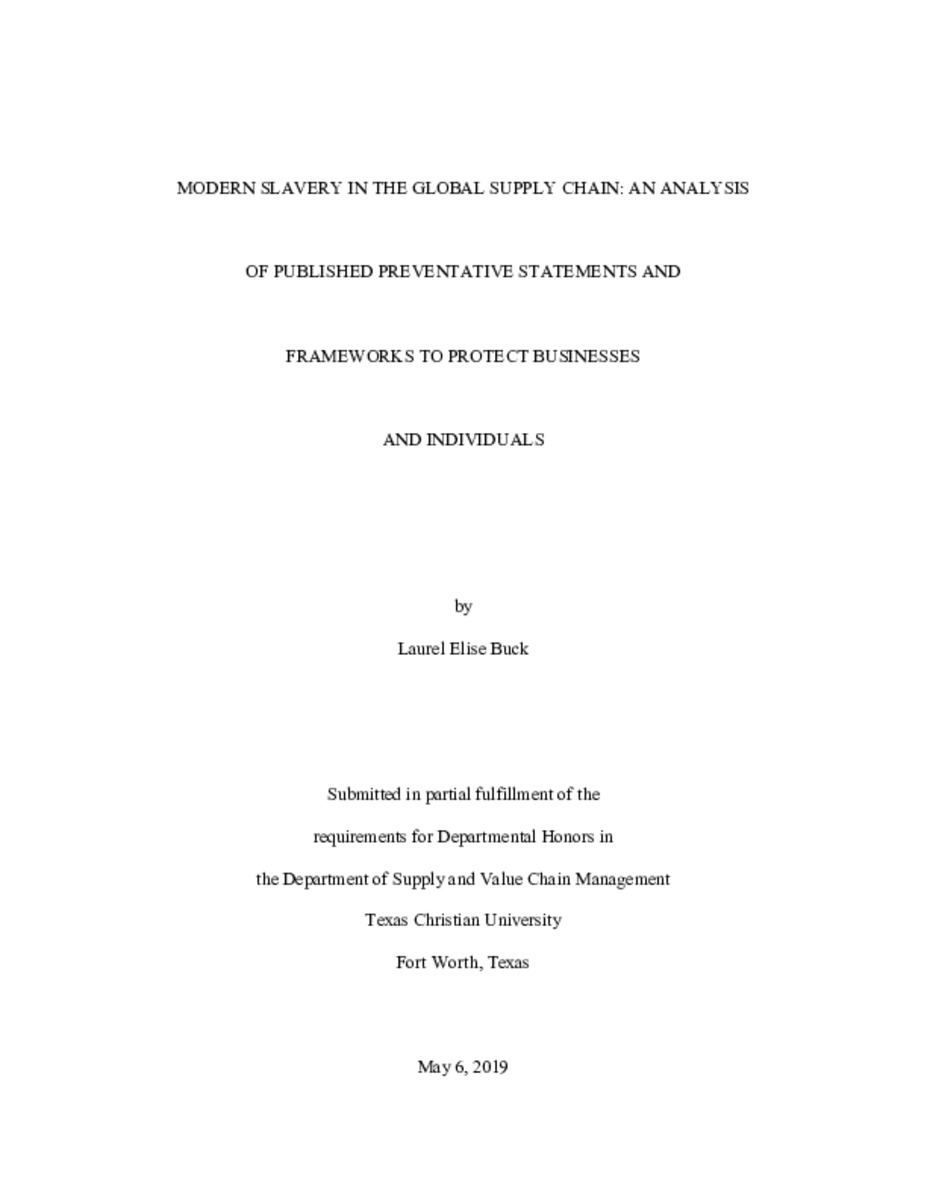Modern Slavery and the Global Supply Chain: An Analysis of Published Preventative Statements and Frameworks to Protect Businesses and IndividualsShow full item record
| Title | Modern Slavery and the Global Supply Chain: An Analysis of Published Preventative Statements and Frameworks to Protect Businesses and Individuals |
|---|---|
| Author | Buck, Laurel |
| Date | 2019 |
| Abstract | Modern slavery generates an estimated $150 billion in revenue annually. Driven from 40.3 million victims' toils, this is one of the most profitable illicit industries. Of the estimated 24.9 million slaves institutionalized in forced labor, 16 million are exploited in the private sector. These 16 million are oppressed within corporate supply chains. This paper addresses the need for a common tool and set of criteria governing organizations' actions in combating modern slavery within operations and cascading actions through supply chain tiers to move the private sector forward in eradicating modern slavery by ensuring transparent reporting and effective action. Specific research concentrations include the impacts of modern slavery on and the increasing liability of parent companies of global supply chains, making a case for increasing down-tier awareness of vulnerabilities to encourage action, and decreasing parent company liability for such crimes. The research deliverable, a modern slavery publication review and analysis, is preceded by a literature review exploring general information on the broader topics of global supply chains, modern slavery and corporate social responsibility. The final deliverable consists of recommendations for adoption of publications and individual criterion, adaptable for all supply chain levels, for corporations to use in implementing, expanding and improving their modern slavery and transparency initiatives. The research and analysis detailed provides an instructive introduction for any type of private sector organization wanting to implement, expand or improve their modern slavery and transparency initiatives. Organizations implementing their first initiatives are recommended to use publications from the Business Rights and Human Resource Centre, Burberry, Tesco, StrongerTogether and Marks & Spencer as the bedrock of their own to ensure comprehensiveness and effectiveness based on industry standards. Heed should be paid to incorporate the vital criteria not included in most publications. These combine to provide a valuable foundation for expanding implementation of such initiatives and will hopefully play a small role in their disentanglement from modern slavery, and ultimately eradication from the private sector altogether. Embracing corporate social responsibility and going beyond compliance requirements to work toward eradicating modern slavery are difficult positions for companies to commit to without backlash or relentless scrutiny. However, the difficulties are met with benefits: companies are likely to increase profits and social acceptance, build brand recognition, and more from adopting proactive approaches to such crimes. Truly, the greatest risk for companies engaging in modern slavery efforts is the risk of inaction; adopting and implementing modern slavery measures benefits public, private, and imprisoned stakeholders yearning for their freedom. |
| Link | https://repository.tcu.edu/handle/116099117/27062 |
| Department | Supply and Value Chain Management |
| Advisor | Meade, Laura |
| Additional Date(s) | 2019-05-19 |
Files in this item
This item appears in the following Collection(s)
- Undergraduate Honors Papers [1463]
Related items
Showing a few items related by title, author, creator and subject.
-
An exploration of the theory and practice of slavery in seventeenth-century Brazil in the writings of Padre Antônio Vieira
Landers, Sharon (1995)Antonio Vieira (1608-1697) achieved prominence during the seventeenth century as a preacher and master of the Portuguese language. Various editions of his writings have preserved his colorful prose for nearly three centuries. ... -
DRAFT - First Year Report 1. Slavery
TCU Race and Reconciliation Initiative Committee (2021-03-01) -
Blank spaces: global geographies of moral capitalism in the Anti-Slavery Reporter 1831-1833
Huggins, Sofia Prado (2023-05-01)I argue that the Anti-Slavery Reporter, the flagship periodical of the British Anti-Slavery Society, contributed to the geographic marginalization of people of color in the British empire by emphasizing the role of white ...
© TCU Library 2015 | Contact Special Collections |
HTML Sitemap





